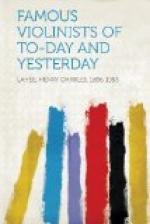“So long as virtuosi walked (or galloped) in their proper sphere, they amused by their mechanical tours de force, charmed by their finesse and did no great harm to musical taste. They were accepted cum grano salis, applauded for their dexterity, and admired for the elegance with which they were able to elaborate thoughts in themselves of every slight artistic worth. But recently our ‘virtuosi’ have been oppressed with a notion that, to succeed in this country, they must invade and carry by storm the ‘classics’ of the art, instead of adhering exclusively as of old to their own fantasies and jeux de marteaux. One composition after another by the great masters is seized upon and worried. If they were things of flesh and blood, and could feel the gripe, be conscious of the teeth, and appreciate the fangs of these rapid-devouring ‘virtuosi,’ concertos, sonatas, trios, etc., would indeed be in a pitiable condition. Happily, being of the spirit, they bleed not, but are immortal.
“One great result attending Herr Joachim’s professional visit to London is, that it enables both professors and amateurs opportunity after opportunity of studying his manner of playing the works of the giants of music. How Herr Joachim executes these compositions—how differently from the self-styled ‘virtuosi,’ how purely, how modestly, how wholly forgetful of himself in the text he considers it an honour being allowed to interpret to the crowd—we need scarcely remind our readers. Not a single eccentricity of carriage or demeanour, not a moment of egotistical display, to remind his hearers that, although Beethoven is being played, it is Joachim who is playing, ever escapes this truly admirable and (if words might be allowed to bear their legitimate signification) most accomplished of ‘virtuosi.’”
As an example of Joachim’s conscientiousness, the following little anecdote will serve to give an idea. Joachim once introduced into the point d’orgue of Beethoven’s concerto a cadence terminated by a trait en octave, which caused an extraordinary effect. People spoke only of this cadence; it was the event of the evening wherever he played. This success wounded his feelings of artistic probity; he considered it unbecoming that people should be more taken up with the skill of the executant than with the beauties of the music, and the cadence was suppressed.
During the many years of his connection with the Hochschule, Joachim’s personal influence has been exerted upon a large number of pupils, in fact almost every well-known violin player has been to Berlin to seek his advice and instruction, and the players he has perfected are almost without number. Many anecdotes are told concerning his kindness to his pupils, but so greatly is he sought after that comparatively few of the hundreds who flock to Berlin are able to reach him.




